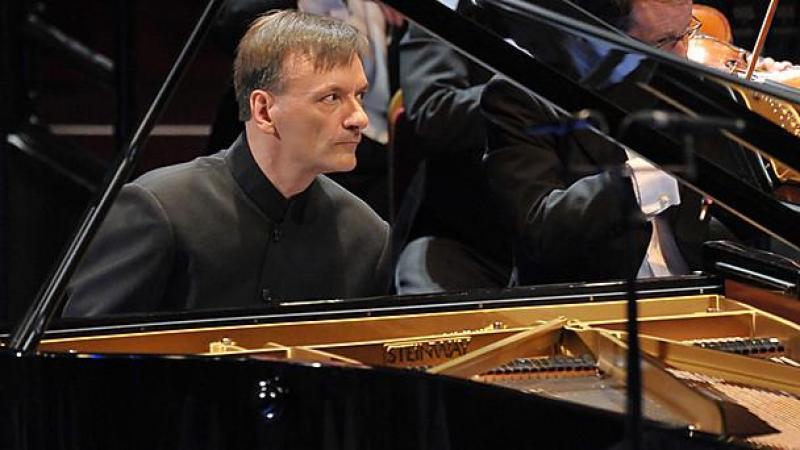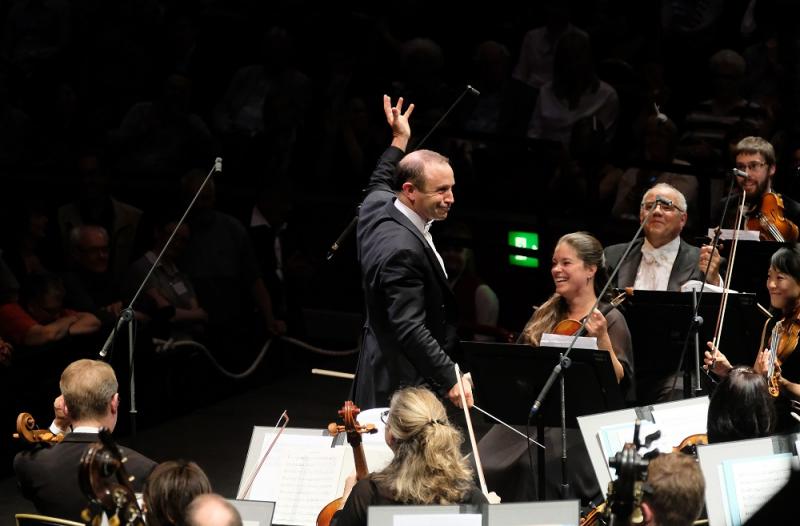Prom 6: Hough, BBC Philharmonic, Mark Wigglesworth review - poetry and power | reviews, news & interviews
Prom 6: Hough, BBC Philharmonic, Mark Wigglesworth review - poetry and power
Prom 6: Hough, BBC Philharmonic, Mark Wigglesworth review - poetry and power
Hough proves a reflective and refined soloist, Wigglesworth a dynamic podium presence

This Prom by the BBC Philharmonic was billed as a celebration of the 50th anniversary of the Royal Northern College of Music, in distant Manchester.
By design or lucky accident, the RNCM was well represented, with a new work by recent graduate Grace-Evangeline Mason, and a concerto performed by slightly less recent graduate Sir Stephen Hough (he was ennobled last week). Conductor Mark Wigglesworth (pictured below, image Mark Allan) has no obvious connection with the college or the orchestra, though he did study at Manchester University. He is always an asset on the podium, and each of the three works benefited from his focus, drive and insight.
New music in recent years has suffered from the unfortunate trend of works titled in uniform lower case. Grace-Evangeline Mason clearly opposes this notion, as witness her new work ABLAZE THE MOON. The block capitals seemed ill-fitting for such an understated and nocturnal work. It is based on a poem by Sara Teasdale, and Mason tells us that the melodies follow the lines of the poem, credible given the music’s broadly strophic form. But the textures here are just as important as the tunes, with orchestral moods drawing on Ravel, all billowy strings and warm clouds of woodwind. The melodies gave many of the section soloists a chance to shine. The strings were well co-ordinated, too, but struggled to fill the hall with sound. This was clearly intended to be an immersive experience, but, like many Proms premieres, was a victim of Albert Hall’s unforgiving acoustic. I’ll bet it sounded great on the radio.
Commemorating Rachmaninov’s 150th this year, the Proms are presenting all four of his piano concertos, and Stephen Hough drew the short straw, or perhaps volunteered valiantly, to play the unloved First. Hough is more a poet than a powerhouse when it comes to Rachmaninov, and finds much beauty in the work, though makes little effort to round out its rough edges. He and Wigglesworth make a great team (they have recorded the Brahms concertos together), as Wigglesworth always draws the maximum passion from the orchestral melodies and textures. That seems to spur the pianist on, and the result is more power and passion in the solo part. Even so, he retains a sense of reserve, and much of the first movement was characterised by delicate and precise textures in the piano, contrasting passionate string melodies beneath. But Hough also knows when to let go, and the first movement cadenza was an impressive display of passion and power. The finale, too, a propulsive and dynamic juggernaut under Wigglesworth’s baton, drew welcome drama from the pianist, his performance finally rising to the drama that the work demands.
In the first, the glassy string textures at the opening were particularly impressive, and the off-stage brass imparted an ideal sense of distance (one thing the Albert Hall is good for). The scherzo second movement was impressive for the clean lines of the dance forms, each waltz and Ländler with a slightly different lilt, but all well defined and supported by the rich bass. The funeral march/nursery song third felt a little too fast and square – surely Wigglesworth could have held back here? – but remained effective for the precision and clarity of the playing, especially from solo double bass, timpani and bassoon.
But the finale was an unqualified success, thanks again to Wigglesworth’s clean, dynamic power. Some scrappy brass ensemble at the start came as a surprise, but was soon forgotten when the first quiet interlude introduced an irresistibly deep and mellow tone from the strings. The variety of moods and textures that Mahler visits over the course of the movement was well presented, but the inexorable momentum towards the ending was never far from the surface. That conclusion, when it came, was powerful indeed, but precise and well controlled too – a sound to truly fill this vast arena.
rating
Share this article
The future of Arts Journalism
You can stop theartsdesk.com closing!
We urgently need financing to survive. Our fundraising drive has thus far raised £49,000 but we need to reach £100,000 or we will be forced to close. Please contribute here: https://gofund.me/c3f6033d
And if you can forward this information to anyone who might assist, we’d be grateful.

Subscribe to theartsdesk.com
Thank you for continuing to read our work on theartsdesk.com. For unlimited access to every article in its entirety, including our archive of more than 15,000 pieces, we're asking for £5 per month or £40 per year. We feel it's a very good deal, and hope you do too.
To take a subscription now simply click here.
And if you're looking for that extra gift for a friend or family member, why not treat them to a theartsdesk.com gift subscription?
more Classical music
 Solomon, OAE, Butt, QEH review - daft Biblical whitewashing with great choruses
Even a top soprano and mezzo can’t make this Handel paean wholly convincing
Solomon, OAE, Butt, QEH review - daft Biblical whitewashing with great choruses
Even a top soprano and mezzo can’t make this Handel paean wholly convincing
 Two-Piano Gala, Kings Place review - shining constellations
London Piano Festival curators and illustrious friends entertain and enlighten
Two-Piano Gala, Kings Place review - shining constellations
London Piano Festival curators and illustrious friends entertain and enlighten
 Echo Vocal Ensemble, Latto, Union Chapel review - eclectic choral programme garlanded with dance
Beautiful singing at the heart of an imaginative and stylistically varied concert
Echo Vocal Ensemble, Latto, Union Chapel review - eclectic choral programme garlanded with dance
Beautiful singing at the heart of an imaginative and stylistically varied concert
 Scott, Irish Baroque Orchestra, Whelan, RIAM, Dublin review - towards a Mozart masterpiece
Characteristic joy and enlightenment from this team, but a valveless horn brings problems
Scott, Irish Baroque Orchestra, Whelan, RIAM, Dublin review - towards a Mozart masterpiece
Characteristic joy and enlightenment from this team, but a valveless horn brings problems
 Classical CDs: Voice flutes, flugelhorns and froth
Baroque sonatas, English orchestral music and an emotionally-charged vocal recital
Classical CDs: Voice flutes, flugelhorns and froth
Baroque sonatas, English orchestral music and an emotionally-charged vocal recital
 Kanneh-Mason, Britten Sinfonia, Shave, Milton Court - a grin and a big beaming smile
A pair of striking contemporary pieces alongside two old favourites
Kanneh-Mason, Britten Sinfonia, Shave, Milton Court - a grin and a big beaming smile
A pair of striking contemporary pieces alongside two old favourites
 theartsdesk at the New Ross Piano Festival - Finghin Collins’ musical rainbow
From revelatory Bach played with astounding maturity by a 22 year old to four-hand jazz
theartsdesk at the New Ross Piano Festival - Finghin Collins’ musical rainbow
From revelatory Bach played with astounding maturity by a 22 year old to four-hand jazz
 First Person: Manchester Camerata's Head of Artistic Planning Clara Marshall Cawley on questioning the status quo
Five days of free events with all sorts of audiences around Manchester starts tomorrow
First Person: Manchester Camerata's Head of Artistic Planning Clara Marshall Cawley on questioning the status quo
Five days of free events with all sorts of audiences around Manchester starts tomorrow
 Goldscheider, Brother Tree Sound, Kings Place review - music of hope from a young composer
Unusual combination of horn, strings and electronics makes for some intriguing listening
Goldscheider, Brother Tree Sound, Kings Place review - music of hope from a young composer
Unusual combination of horn, strings and electronics makes for some intriguing listening
 theartsdesk Q&A: composer Donghoon Shin on his new concerto for pianist Seong-Jin Cho
Classical music makes its debut at London's K-Music Festival
theartsdesk Q&A: composer Donghoon Shin on his new concerto for pianist Seong-Jin Cho
Classical music makes its debut at London's K-Music Festival

Add comment